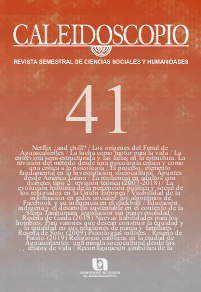Netflix ¿and chill?
DOI:
https://doi.org/10.33064/41crscsh1356Keywords:
jouissance, gaze, repetition, social discourseAbstract
In this century, unbridled speed in all scopes of human life has turned both time and experiences into consumer objects. Following the democratization of the internet and digital media, the subject is faced with options that apparently point to greater freedom but that are revealed ultimately as a manifestation of the imperative of enjoyment, such that the subject is captured in repetition. Among other manifestations of this trend are the so-called streaming services, before which questions arise, such as Does the subject have a degree of control over these contents? Are we faced with an imperative that voraciously demands “Enjoy!”, but which now specifies “Enjoy looking at this!”? The purpose of this paper is to explore, on a psychoanalytic perspective, some possible answers to these questions, pointing out the scope of this imperative, as well as might-be options of the subject before it.
Downloads
References
Collins Dictionary (2015). “Binge-watch”-Collins Word of the Year 2015. Word Lover's blog. Recuperado de https://www.collinsdictionary.com/word-lovers-blog/new/binge-watch-collins-word-of-the-year-2015,251,HCB.html
Freud, S. (1911/1992). Formulaciones sobre los dos principios del acaecer psíquico. En Obras Completas (vol. XII, págs. 217-232). Buenos Aires: Amorrortu.
Freud, S. (1915/1992). Pulsiones y destinos de pulsión. En Obras Completas (vol. XIV, págs. 105-134). Buenos Aires: Amorrortu.
Freud, S. (1920/1992). Más allá del principio de placer. En Obras Completas (vol. XVIII, págs. 1-62). Buenos Aires: Amorrortu.
Konner, L. (productor) y Taylor, A. (directora) (2005). Žižek! [Documental]. Alemania: Zeitgeist films.
Lacan, J. (1985). Psicoanálisis y medicina. El lugar del psicoanálisis en la medicina. En Intervenciones y textos (págs 86-99). Buenos Aires: Manantial.
Lacan, J. (2010). El Seminario. Libro 11. Los cuatro conceptos fundamentales del psicoanálisis. Buenos Aires: Paidós.
López, R. (17 de septiembre de 2015). Crisis del saber: Aquí no hay ningún porqué [Mensaje en un blog]. Crisis ¿Qué dicen los psicoanalistas? Recuperado de http://crisis.jornadaselp.com/textos/crisis-del-saber-aqui-no-hay-ningun-por-que/
Molina, A. (27 de marzo de 2016). Entrevista-Miquel Bassols: “Freud era un misógino contrariado, pero se dejó enseñar por las mujeres”. Recuperado de https://elpais.com/elpais/2016/03/21/eps/1458559714_764015.html
Pinch Provisions (s.f.). Binge-Watching Survival Kit. Recuperado de https://www.pinchprovisions.com/products/binge-watching-survival-kit
Published
How to Cite
Issue
Section
License
Licencia Creative Commons Atribución-NoComercial-CompartirIgual 4.0 Internacional
El lector es libre de compartir o adaptar el material en cualquier medio o formato bajo las condiciones siguientes: (a) debe reconocer adecuadamente la autoría, proporcionar un enlace a la licencia e indicar si se han realizado cambios; (b) no puede utilizar el material para una finalidad comercial y (c) si remezcla, transforma o crea a partir del material, deberá difundir sus contribuciones bajo la misma licencia que el original.
Resumen de la licencia
https://creativecommons.org/licenses/by-nc-sa/4.0/deed.es_ES
Texto completo de la licencia
https://creativecommons.org/licenses/by-nc-sa/4.0/legalcode
Cada autor es responsable del contenido de su artículo. En el caso de un texto colectivo, el primer autor asume la responsabilidad intelectual de los resultados del proceso editorial; los autores son responsables de obtener la licencia de autor para reproducir materiales gráficos o fotográficos que pertenecen a terceros.
Los autores asumen plena responsabilidad en el caso de falsificación de datos o falta de autenticidad en la investigación. Se comprometen, también, a no reutilizar trabajos ya publicados, total o parcialmente, para presentarlos en otra publicación.
Estas condiciones aplican tanto a la versión impresa como a la versión electrónica de la revista.


















